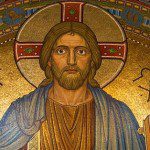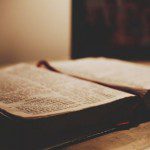I wish we had had time to hear the whole of Zephaniah tonight. It's been so tempting to me to preach through that whole book, verse by verse, but I promise I won't. If you have a bible near you and can turn there, with a finger in Matthew 28, that would be wonderful. We have just heard moments from the tapestry of God's salvation work. A work that began long long long ago, in that primordial moment, where God brought everything into being, for his own purposes, according to his own will. We ourselves, this evening, began with the flood, which is hearkened to in the opening lines of Zephaniah. “I will,” says God, “utterly sweep away everything from the face of the earth.” Zephaniah reverses the order of creation. Man will go first, then the beasts, then the birds of the air, then the fish of the sea. The Lord is so angry. His wrath against sin is so intense. This first note of Zephaniah is so dark. The Day of The Lord a terrifying, destructive, dark day.
And what is his anger about? Why is The Lord full of wrath? Enough to destroy everything he has made? Four things you might not expect. Zephaniah is not going to talk about injustices against widows and orphans and strangers here. He's not going to go on about covetousness or adultery or so many of the big loud sins that you can definitely see standing looking in from the outside. If we were going to be wrathful and angry about the worst kind of sins, we might not think of the things that Zephaniah lifts up here.
Verse 6, God is angry with “those who have turned back from following The Lord, who do not seek or inquire of him.” They are those who are going to the temple to make a big show of their piety and devotion, but when they get home they are climbing up on their roofs to worship the sun and the moon. They professed to follow The Lord, but when it comes down to it, they are not the least bit interested in what he has to say. They don't “inquire” or ask or try to find out anything.
He is also angry about those, verse 12, who say, “The Lord will not do good, nor will he do ill.” Those people who are complacent and self satisfied and sure that God doesn't care, one way or another. They don't think God is good or evil. They are not interested.
He is also angry about, chapter two verse 15, the city of Zion, his own loved, his own city, who is this “exultant city that lived securely, that said in her heart, I am and there is no one else.” I am? You should feel shocked. It is God who is I Am, whose name is so holy that Israel used to fear and be careful about how and when they wrote it, never mind even said it aloud. I am, says Zion, not you. Me.
The city, believing herself to be god, doesn't need God's name because she has her own.
Then finally, most hauntingly, summing it all up, God is angry with his own people because, chapter three verse two, “she listens to no voice, she accepts no correction, she does not trust in The Lord, she does not draw near to her God.” She is ever running away, putting vast distances between herself and her creator, longing just to get away from him. And as she runs, the darkness falls heavier and heavier over the land.
The gathering darkness is finally complete on the Friday of the week of Passover, the day of Preparation. All of Israel's, of Zion's hatred, a hatred which manifestly and fully stands in for the hatred of the whole world, gathers itself together, plotting, seething, trying to stamp out the nearness of God, the proximity of the one to whom they owe everything. The whole of Zion, as each nail is fixed, as each drop of blood falls, collectively cries, I am, and there is no other.
The darkness is broken by Zephaniah, 2 verse 3, a small band, The Humble of the land, who, like Noah, had been hidden on the day of the anger of The Lord, women. Their names are well worn. They have been there all the time, mostly in the background, not saying very much. They are like women all over the world who make life go forward. Cooking, cleaning, organizing, knowing about the details of the day, what will be needful and good. Like a small group of redeemed Eves with a true Adam, they have tended, cared for him, cooked for him, fussed over him, loved him. And now they hurry through the darkness heavy with failure and despair.
I think Christians must sometimes be tired of always talking about the darkness, the encroaching cultural darkness, the darkness of sin, the darkness of death, the darkness of fear, the darkness of violence and rebellion. The darkness is a place of weakness. The hands fall limp. The heart is tired. There is not very much to do in the darkness. You either strive to over come it, saying I am and there is no other, or you push forward in helplessness and hope.
These women push forward. Mark says that they discuss what they will do about the stone. The walk is long and they are lugging spices. Mary Magdalen, maybe she is younger and quicker, or maybe she is just impatient. She must push on ahead more quickly because she misses all of what happens in Matthew. Her story is picked up in John. Surely none of the women know about the armed guard or they must have then stayed home. They gather up their courage and go, drawing near, coming close. Like Abraham, climbing up the mountain in sorrow with his son. Or Noah, hammering away at his ark. Or Hannah, weeping in the house of The Lord. They go. They fret. But they still go.
And while they go, before they get to the tomb, that great stone cavern of death and defeat, there is an earthquake. The ground shakes under their feet. Matthew says, for, that's because, an Angel of The Lord descended from heaven and came and rolled back the stone and sat on it. His appearance was like lightning. Normally you only get a swift glance of lighting in the midst of a black storm. But the angel looks like lighting and goes on looking like it. The guards, having stood there all night, guarding the dead, become themselves like the dead. Fear produces inaction, as it were, weakness, in this case, unconsciousness. Did they not see, before, the Living One walk past them out of the rock? It was the earthquake and the lightening angel that collapsed them onto the garden floor.
For the angel did not come and roll the stone to let Jesus out. It was to let the women, and us, and all who finally draw close, in to see. The women arrive but they do not collapse in fear. No, the light of truth and life is restored to them.
When The Lord restored the fortunes of Zion.
When he gave back what had been lost.
When he took what was broken and mended it.
When he took what was wrong and righted it.
When The Lord restored the fortunes of Zion, then we're we like those who dream.
You know the kind of dream. The glimmer of hope. The moment when you look out at the future and see light.
“Do not be afraid,” says the angel. So begins all good news in the bible. Do not be afraid. You are right to fear God for his wrath, when you run away from him into perilous darkness. His holiness and justice could be as a torrent that sweeps over you, leaving you splayed out on the garden floor, unconscious and limp. But, if instead, you turn around and draw near. If you say, You are God and there is no other. The Lord is the I Am, not me. And you gather your courage in your throat and look at God and listen to him and look for him and come close to him, Then Do not be afraid. If you look on the one you fear, he will cast out that fear.
Do not be afraid, says the angel. I know why you are here. I know that you seek Jesus who was crucified. I know you come hopeless. I know you came here with spices to anoint a dead man. I'm not surprised that you came here without belief. And yet, you came, you drew near. Therefore, the news is for you. He is risen. He is not here. He is risen. As He Said.
They stoop in and look at the place where he was. The grave clothes neatly folded. Everything quiet. And then they go out. And as they go, The Lord, their Lord, Jesus, meets them, and he says, Hey. More formally, Greetings. But the Greek really means, Hey.
Ordinary. Alive. Real.
And they fall down and worship him.
Zephaniah 3 is the response they are grasping for. Verse…. Sing aloud, O daughter of Zion. You have long been silent in grief. Now, raise up your voice. Rejoice. The Lord has taken away the judgements and darkness against you. The King of Israel is in your midst. You shall never again fear evil. Your limbs shall never be weak with fear. The Lord your God is in your midst. A mighty one who will save. You rejoice.
And he, God himself, will rejoice over you. He will be glad about you.
I told someone recently, which is basically true, that is not about us, it's about God. If you want to understand God and make sense of the complexities and difficulties in the world and in scripture, it's best to turn your eyes to Jesus and not on yourself. Don't go in thinking its about you. But that's not the whole of it. Verse… It is about you. The Lord will rejoice over you! He will be quiet over you with his love. He won't speak judgement over you, he will brood, he will be content and satisfied. And after he has been quiet over you, he will exalt over you with loud singing. It's not just that God will refrain from judging you for your darkness and your sin, no he will be happy about you, happy enough to sing. Loudly.
I have sometimes been worried about what the music will be like in heaven. There are so many different kinds of people who love Jesus and we don't agree on very much, least of all the music. And I've always been secretly afraid that God, who will be choosing the music, will choose that which I don't love. But no,he himself will sing. He himself will provide the music. Because he is happy about you. Because it was all worth it to him.
And then you will sing. We will sing. A new song has already been written for us to sing. Our mouths are filled with laughter and our tongues with shouts of joy. We came home from all the work, from the sorrowful burying of the seed in the ground, singing with the harvest, the Risen One, the Word, the Light.
Alleluia, he is risen.
The Lord is risen indeed, alleluia.











